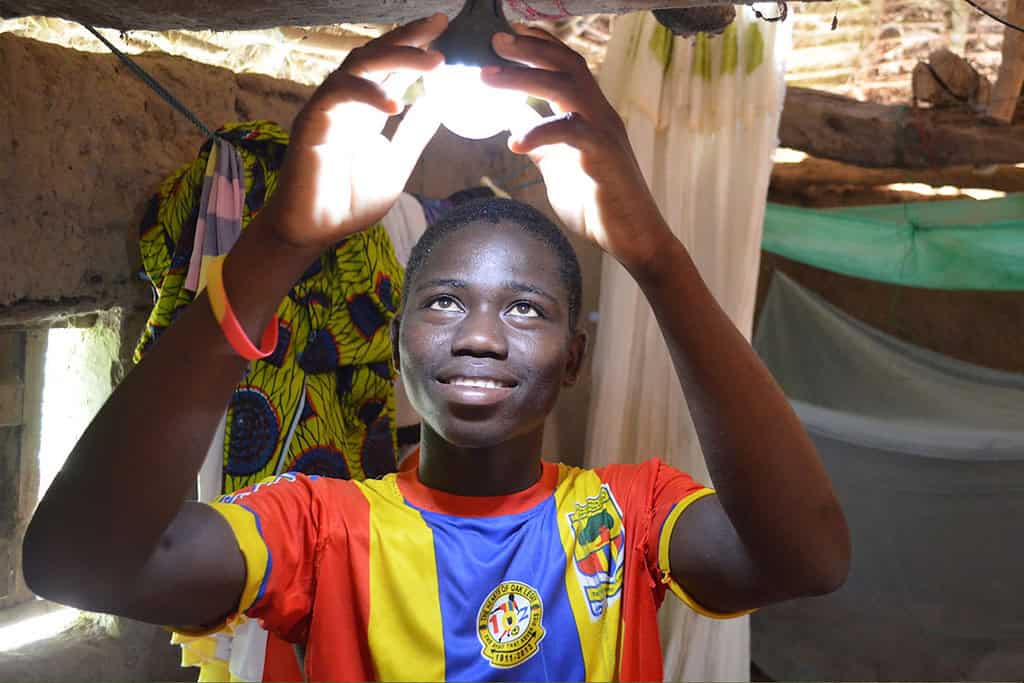All Eyes on West Africa

- Blog
- Energy
- West Africa
When Acumen first began investing in West Africa in 2011, we believed that many of the business models, products and services would translate from East Africa. Overcoming contextual differences, such as access to mobile money and a willingness to pay, was tougher than we thought especially when it came to the energy sector.
That, however, is changing. We recently closed our first energy deal in West Africa and are excited to seed the market and help build the region’s off-grid ecosystem. Our investment, PEG Africa, provides solar home systems on credit to low-income households across Ghana and Côte d’Ivoire.
The problem PEG is trying to solve is big. West Africa has one of the fastest-growing populations in the world, yet only 42 percent of its people has access to energy, leaving more than 110 million without electricity. Given the lack of grid infrastructure, especially in rural parts of West Africa where electrification rates are some of the lowest in the world at 8 percent.
The off-grid sector is experiencing incredible growth with companies scaling to be near or at profitability. There are now more than 44 million certified products on the market that have provided energy access to an estimated 85 million people over the last six years. However, this represents just 7.7 percent of the total population living without energy access. While capital has been flowing in to the sector, only one fifth of it has landed in West Africa. Fewer than 10 institutional investors have funded such companies in West Africa.
Pioneer capital is needed to not only support these early-stage companies but also build the off-grid ecosystem in West Africa. There are already a number of businesses operating in post-conflict countries where mobile money platforms are underdeveloped such as Sierra Leone and Liberia and looking at markets such as Nigeria and Ghana with varied distribution models. These companies, as well as West African governments, are learning from their counterparts in East Africa and evolving in their own ways. We are seeing flexible financing drive affordability, agent networks expand in rural areas, the pay-as-you-go business model mature and successful value-added tax, and import tax exemption programs put in place that make it easier for off-grid energy companies to operate. All the more reason to double-down on these off-grid companies as they create new financing platforms, develop market traction, and build distribution networks and after-sales support.
Since its founding in 2013, PEG has become a leader in the solar home system market and we hope will light the way for more players across West Africa. As investors, we were impressed by the company’s ability to execute and tackle the challenges of low-income customers’ unfamiliarity with mobile money and lack of liquidity in rural areas. By partnering with established players and Acumen investments like M-KOPA and d.light, PEG has built an agent network based on trust to distribute its quality products, customer service, and after-sales support.
Of course, challenges exist. PEG and other West African companies still need to work out the right payment methods to adopt. Each country has its own policies on mobile money and, as a result, different levels of penetration and usage, making it difficult to imitate the success of the East African model. For example, Nigeria is the biggest economy in the region and has the largest number of people living off-grid in the world, but the Central Bank doesn’t allow phone companies to operate mobile money. In Ghana, most rural, low-income customers are new to mobile money and either lack access to the platform or need to improve their literacy. To overcome such challenges, PEG has developed innovative tools to raise awareness of mobile money for direct payments.
Acumen is also exploring distribution companies in other difficult markets like Sierra Leone. Around 70 percent of Sierra Leone’s 6.5 million people live below the poverty line. With a per capita income of $647 and less than 10 percent of people having access to electricity, providing off-grid solutions is imperative. Azimuth, for example, known locally as Easy Solar, is demonstrating how distributing off-the-shelf solar lanterns through one-off purchases and pay-as-you-go can be a workable model by building its corporate culture to empower its employees and its customers. We are impressed with the commitment of the co-founders and the company’s growth trajectory as they work to scale operations to reach more low-income, off-grid customers outside the capital of Freetown.
In the next few years, we believe West Africa will see more entrepreneurs developing and, in some instances, reinventing solutions with mini-grids, solar home systems, and off-grid products that will improve the lives of those at present unserved. Learn more about PEG here.
By Leslie Labruto, Acumen’s Global Energy Lead, and Festus Amoyaw, a Portfolio Manager in Acumen’s West Africa Office.